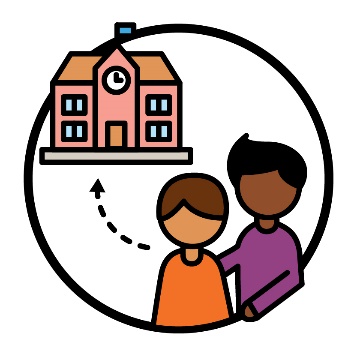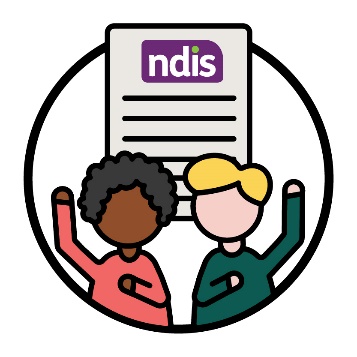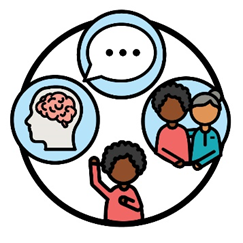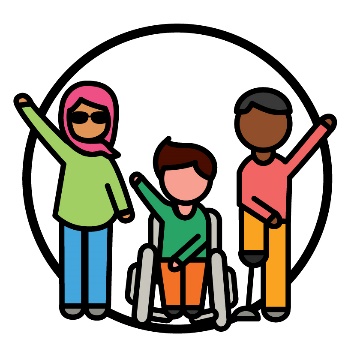Our reports
| The Reference Group connected with the community to find out about issues that affect them. |
| The Reference Group members shared these issues with the NDIA. |
NDIS plans
| Reference Group members shared that NDIS plans are not always the same for children with the same disability. |
| They want to make sure the NDIA makes decisions about plans the same way each time. |
| Members explained there needs to be more information about having one main early childhood worker. And how this can be good for children. |
| Members also explained there is not enough funding for young adults with disability. | |
| Funding is the money from your plan that pays for the supports and services you need. | |
| This includes young adults with intellectual disability. | |
| An intellectual disability can affect how you:
| |
| When young adults don’t have enough funding, it can affect how they take part in their community. This includes how they build skills to take part. | |
| Members shared that the NDIA should make sure children and young people get the right supports. | |
This includes supports that focus on: | ||
|
| |
|
| |
NDIS services and supports
| Reference Group members shared that the NDIA are teaching the community about Justice Liaison Officers (JLOs). |
| JLOs support prisons to understand how the NDIS can support people with disability in prisons. |
| Members explained that many people worry about single parents of children and young people with disability. |
They worry about how caring for a child by themselves affects: | |
|
|
|
|
Members shared that the NDIA should offer better support to: | |
|
|
|
|
This includes families: | |
|
|
|
|
| And it includes better support for male parents. |
| Members shared that the NDIA should support peer support programs for:
|
| Peer support is when people use experiences they share to:
|
| Members explained that the NDIA should provide funding for training for:
|
| This will mean more people in a child’s life can learn how to best support them. |
| Members shared that it makes it harder for families and children when a support changes too often. For example, when the person delivering the support keeps changing. | |
This also affects: | ||
|
| |
|
| |
| Members also shared that people should get paid when they support young people to learn:
| |
Organisations that provide supports
| Reference Group members shared that organisations must make sure their websites work well for people with disability. | |||
This includes: | ||||
|
| |||
|
| |||
|
| |||
| Members explained that people worry if supports for young people with disability are:
| |||
| This includes young people who use support workers from both:
| |||
| Registered providers:
| |||
| Members explained that some people with disability have challenges with disability support workers. | |||
| And some people with disability shared that providers who aren’t registered will do complex tasks with no training. This risks their safety. | |||
| Members shared that state and territory governments should better support parents and children. This includes when they have contact with schools. | |||
| For example, having school reports that focus more on what children are doing well. | |||
The community
| Reference Group members explained there are a lot more people with autism who take part in the NDIS. |
| Autism affects how you:
|
| People worry about how this will affect other people with disability. This includes their supports and funding. |
| Members shared that the NDIA Board should speak up for carers of people with disability. The NDIA Board is a group of people who make decisions about all parts of the NDIA. |
| Members also shared that some people worry about the Australian Government’s plan for how much funding they will give the NDIS. |
Our reports
| The Reference Group connected with the community to find out about issues that affect them. |
| The Reference Group members shared these issues with the NDIA. |
NDIS plans
| Reference Group members shared that NDIS plans are not always the same for children with the same disability. |
| They want to make sure the NDIA makes decisions about plans the same way each time. |
| Members explained there needs to be more information about having one main early childhood worker. And how this can be good for children. |
| Members also explained there is not enough funding for young adults with disability. | |
| Funding is the money from your plan that pays for the supports and services you need. | |
| This includes young adults with intellectual disability. | |
| An intellectual disability can affect how you:
| |
| When young adults don’t have enough funding, it can affect how they take part in their community. This includes how they build skills to take part. | |
| Members shared that the NDIA should make sure children and young people get the right supports. | |
This includes supports that focus on: | ||
|
| |
|
| |
NDIS services and supports
| Reference Group members shared that the NDIA are teaching the community about Justice Liaison Officers (JLOs). |
| JLOs support prisons to understand how the NDIS can support people with disability in prisons. |
| Members explained that many people worry about single parents of children and young people with disability. |
They worry about how caring for a child by themselves affects: | |
|
|
|
|
Members shared that the NDIA should offer better support to: | |
|
|
|
|
This includes families: | |
|
|
|
|
| And it includes better support for male parents. |
| Members shared that the NDIA should support peer support programs for:
|
| Peer support is when people use experiences they share to:
|
| Members explained that the NDIA should provide funding for training for:
|
| This will mean more people in a child’s life can learn how to best support them. |
| Members shared that it makes it harder for families and children when a support changes too often. For example, when the person delivering the support keeps changing. | |
This also affects: | ||
|
| |
|
| |
| Members also shared that people should get paid when they support young people to learn:
| |
Organisations that provide supports
| Reference Group members shared that organisations must make sure their websites work well for people with disability. | |||
This includes: | ||||
|
| |||
|
| |||
|
| |||
| Members explained that people worry if supports for young people with disability are:
| |||
| This includes young people who use support workers from both:
| |||
| Registered providers:
| |||
| Members explained that some people with disability have challenges with disability support workers. | |||
| And some people with disability shared that providers who aren’t registered will do complex tasks with no training. This risks their safety. | |||
| Members shared that state and territory governments should better support parents and children. This includes when they have contact with schools. | |||
| For example, having school reports that focus more on what children are doing well. | |||
The community
| Reference Group members explained there are a lot more people with autism who take part in the NDIS. |
| Autism affects how you:
|
| People worry about how this will affect other people with disability. This includes their supports and funding. |
| Members shared that the NDIA Board should speak up for carers of people with disability. The NDIA Board is a group of people who make decisions about all parts of the NDIA. |
| Members also shared that some people worry about the Australian Government’s plan for how much funding they will give the NDIS. |














































